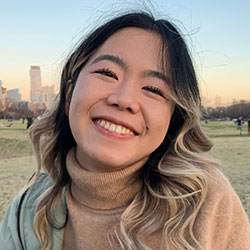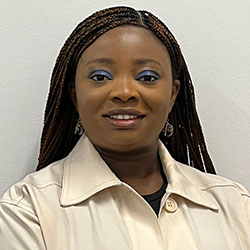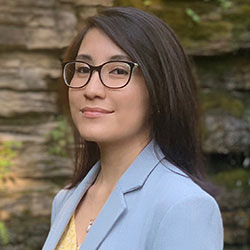Building Mentoring Relationships and Peer Networks at CRA-WP Grad Cohort Workshops
The annual Computing Research Association (CRA) Widening Participation (WP) Grad Cohort for Women and Grad Cohort for Inclusion, Diversity, Equity, Accessibility, and Leadership Skills (IDEALS) workshops provide an opportunity for women, historically underrepresented groups, and people with disabilities in the early stages of their graduate studies in computing to build mentoring relationships and develop peer networks.
As a member of the CRA, Northwestern Computer Science received full support for three graduate students to attend the 2024 conference, held April 11 – 13 in Minneapolis. In addition, the department funded one additional student to attend the conference.
Of the more than 600 students who applied to participate, Herminio Bodon, Mandi Cai, Monisola Jayeoba, and Mara Ulloa were among the 275 participants at the conference.
Russ Joseph, associate professor of electrical and computer engineering and associate professor of computer science at Northwestern Engineering, is a founding steering committee member of the CRA-WP Grad Cohort for IDEALS. He was also among the esteemed group of leaders and senior researchers in academia, industry, and government laboratories that led workshop sessions. Joseph and Chad Jenkins (University of Michigan) facilitated the interactive session “Balancing Graduate School and Personal Life.” In addition, Joseph provided one-on-one academic and career advising.
We asked the students about the importance and benefits of attending this type of mentoring conference, their experience attending the CRA-WP workshops, and an especially resonant piece of advice or perspective they gained from the event.
Herminio Bodon
Bodon, a PhD student in Northwestern’s Technology and Social Behavior program (TSB), attended the CRA-WP Grad Cohort Workshop for IDEALS.
His research — situated at the intersection of human-computer interaction, data science, and learning sciences — focuses on exploring how children learn in complex environments and building tools to support learning.
A member of the Technological Innovations for Inclusive Learning and Teaching Laboratory, Bodon is advised by Marcelo Worsley, Karr Family Associate Professor of Computer Science at the McCormick School of Engineering and associate professor of learning sciences at Northwestern’s School of Education and Social Policy.
Mandi Cai

Cai noted that conferences like the CRA-WP Grad Cohort for Women are helpful reminders of the importance of building and maintaining support systems within computing. She appreciated meeting creative people navigating similar research challenges, exchanging ideas and guidance, and experiencing the mutual support among her peers.
“Another researcher at the conference told me that ‘perfection is the enemy’ and to just go for it,” Cai said. “It was the shove I needed to get a project I’m working on off the ground without overthinking it so much and to be open to what my findings could look like.”
A member of the Midwest Uncertainty Collective (MU Collective), Cai is advised by Matthew Kay, an associate professor of computer science at Northwestern Engineering and of communication studies at Northwestern’s School of Communication.
Monisola Jayeoba

She also gained constructive early feedback, practiced public speaking, and honed her presentation skills via the opportunity to present a three-minute lightning talk on her research, which lies at the intersection of human-computer interaction, computer-supported cooperative work, and health informatics.
Jayeoba highlighted a resonating message of keynote speaker Dilma Da Silva, Ford Motor Company Design Professor II of Computer Science and Engineering at Texas A&M University and acting assistant director of the US NSF Directorate for Computer & Information Science and Engineering. Da Silva emphasized the importance of diversifying knowledge and acquiring a wide range of relevant skills.
“This is crucial in a fast-paced and rapidly evolving labor market,” Jayeoba said “It reminded me to make intentional plans and decisions in the remaining years of my doctoral studies.”
Jayeoba is advised by Maia Jacobs, Lisa Wissner-Slivka and Benjamin Slivka Professor of Computer Science at Northwestern Engineering and assistant professor of preventive medicine at Northwestern’s Feinberg School of Medicine.
Mara Ulloa

Ulloa is a member of the Center for Advancing Safety of Machine Intelligence (CASMI) research project team studying stress levels during pregnancy and developing prevention and intervention approaches for improving maternal and fetal health outcomes leveraging novel Machine Learning and Human-Computer Interaction methods.
As Ulloa prepares to share her research findings from the CASMI project, she was particularly inspired by the CRA-WP Grad Cohort Workshop for IDEALS session “Publishing Your Research,” led by Shaun Kane (Google Research) and Gonzalo Ramos (Microsoft Research).
“The session highlighted the essence of a significant research contribution and the importance of building a publishing muscle by constantly sharing your work through posters abstracts, doctoral symposia, and workshop papers as you progress towards publishing full-length articles at top venues,” Ulloa said.
Jacobs and Nabil Alshurafa, associate professor of preventive medicine at Feinberg and (by courtesy) associate professor of computer science and electrical and computer engineering at Northwestern Engineering, are co-principal investigators of the CASMI-funded research project, “Co-Designing Patient-Facing Machine Learning for Prenatal Stress Reduction.”
